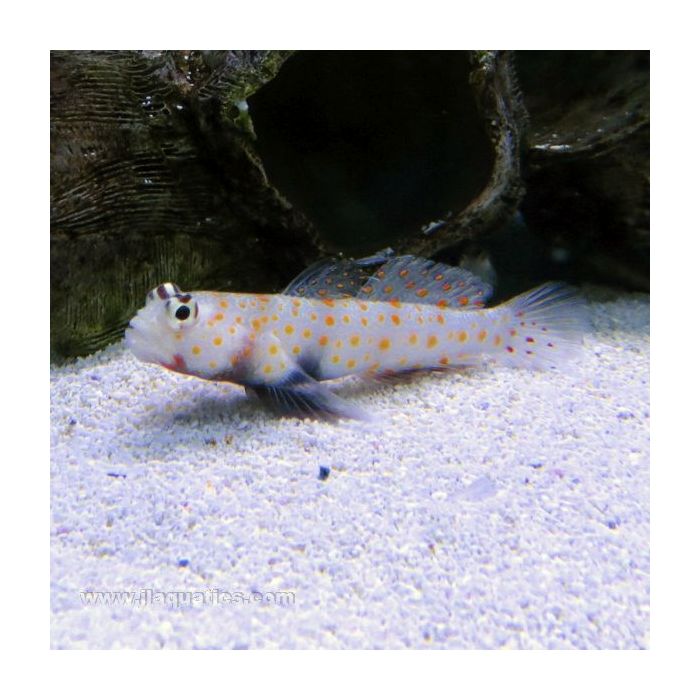Orange Spot Shrimp Goby (Asia Pacific)
The Orange Spot shrimp goby is aptly named for the many bright tangerine spots covering its entire body, face and fins. Its white body may show a few darker bands, and it has distinctive dark pelvic fins. Males and females are visually identical. It grows up to 3.5 inches; we recommend an aquarium 10 gallons or larger.
Shrimp gobies go by many names including prawn gobies and watchman gobies. They may be kept on their own just fine in an aquarium; however it is especially fascinating to pair them with a pistol shrimp. The goby will form a strong bond with the shrimp and mutually benefit each other. The hard-working shrimp will excavate a burrow under the sand for them to live in, consisting of several tunnels, entrances and exits. The sharp-eyed goby stands guard at one of the entrances and keeps an eye out for threats. As the shrimp goes about maintaining the tunnel and searching for food it keeps one antennae on the goby. If the goby sees danger it flicks its tail, signaling to the shrimp to make a hasty retreat. The goby may follow quickly if the danger is threatening enough. At nighttime or when a tunnel is not being used the shrimp will block it off with shells and small rocks. It is important to provide deep sand of at least three inches and plenty of shells and crushed coral of various sizes so the shrimp has enough building material to create a stable dwelling. Rocks should be placed on the aquarium glass and sand poured around them to eliminate the danger of a cave-in when the shrimp excavates.
We recommend a shrimp and its goby partner be added to the aquarium at the same time; it is best if they are placed in a net together and gently lowered to the aquarium bottom. There are three common types of pistol shrimp that pair with gobies; the Tiger, Fine Striped, and Candy Cane pistol shrimp.
Unless they are a pair shrimp gobies tend to be quite territorial with each other- if more than one is to be kept in the same aquarium we recommend space enough to accommodate at least 24 inches between burrows. They are typically peaceful with all other types of fish.
We recommend the tank be securely covered as sand dwelling gobies may be prone to jumping from open top aquaria.
Sand gobies are primarily carnivores and their diet should include plenty of high quality meaty items, marine algae, Spirulina, and frozen Mysis shrimp. It is preferable to feed more than once a day and to let some food land on the bottom of the aquarium. Frozen food is best, however in time they usually learn to eat dry foods.
As one of the largest families of fish there are near countless varieties of gobies which inhabit every different niche on the reef. They are coral safe and typically quite active and friendly with other fish. They have the ability to change sex to form pairs, although they don't always do so. Most gobies are imported from the Philippines.
Gobies are diminutive fish typically with elongated bodies, and as such we do not recommend any aggressive or large-mouthed fish to be kept with them; this includes all groupers, snappers, sweetlips, soapfish, lionfish, eels, goatfish, anglers/frogfish, leaf fish, etc.
















